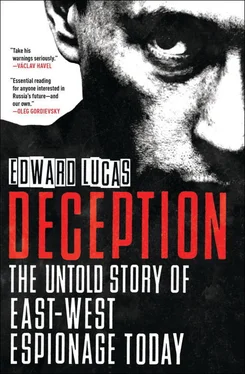I did not always get on with Mr Browder during my time in Moscow as bureau chief for the Economist from 1998 to 2002. Our disputes may look like ancient history now but they were sharp at the time. In particular, although I admired his energy and brains, I disliked his backing for Mr Putin’s regime. The new government had in my view brought superficial stability, but at far too high a price. Moreover I was unmoved by the plight of foreign investors who had knowingly put their money into companies run by crooks, nincompoops and political cronies, and were then surprised to find that those businesses were run badly. If you buy shares in Russia, you should expect to be defrauded, rather as if you go mud-wrestling you expect to get dirty.
Our sharpest disagreement came in 2003 after I left Russia, when we took opposite sides over the defining issue of the early Putin era. Mr Browder endorsed the arrest of Mikhail Khodorkovsky, then Russia’s richest man, who had defied Mr Putin, not least by turning up tieless to a meeting in the Kremlin – a huge snub in protocol-conscious Russia. Mr Khodorkovsky, an energy tycoon, had also put a large number of parliamentarians on the payroll to bolster his political clout and was planning a deal with a big American oil company in defiance of Kremlin guidelines. He was certainly an obstacle to Mr Putin’s plan to seize the commanding heights of power in Russia. Some thought he might even want to displace Mr Putin from the top job (in his first years in office, the Russian president had seemed a grey and somewhat unimpressive figure). Mr Putin’s vengeance was decisive and ruthless. Mr Khodorkovsky was jailed on flimsy charges and his company Yukos (which had many foreign shareholders) was bankrupted, with its assets disposed of in a dodgy auction where Kremlin cronies bought them cheaply. 5I agreed with Mr Browder that Mr Khodorkovsky had in previous years abused the rights of his minority shareholders, and I did not see him simply as a martyr to repression. But I reckoned that the balance between the tycoon’s past misdeeds and later virtues mattered less than the authorities’ flagrant abuse of the courts in a political vendetta.
Mr Browder could afford to discount my criticism. He was making millions. But he was also making more powerful enemies elsewhere: every dollar not stolen as a result of his efforts to stop corporate sleaze dented the income of some corrupt and powerful person. In November 2005 border guards turned him back from Moscow’s Sheremetyevo airport, citing undisclosed national security grounds. 6Returning to London, he stayed bullish on Russia, lobbying to overturn the authorities’ decision and insisting that his plight was a mere misunderstanding. But at a summit meeting in St Petersburg in July 2006 [10] j Russia was chairing the G-8 (a group of countries that in those days tried to run the world economy). The original G-6, convened in 1975, comprised Britain, France, Germany, Italy, Japan and the United States and then added Canada as a member. As a sop to Mr Yeltsin, Russia was invited to join in 1997. Since 2009, the G-20, which includes the big emerging economies, has largely taken the G-8’s place.
a journalist raised Mr Browder’s case at a press conference. Mr Putin replied that he had never heard of Mr Browder (which was implausible) but that he could ‘imagine that this person had broken the laws of our country’ 7. At that point, Mr Browder says, he gave up trying to return to Russia: the signal of deep official displeasure was unambiguous and he did not want to share Mr Khodorkovsky’s fate. Behind the scenes he had already begun liquidating his holdings and pulling out his staff. With Mr Browder no longer at the helm in Moscow, investors were asking for their money back; other emerging markets looked more attractive. As it happened, the move was not just prescient but profitable. Shortly afterwards, the world financial crisis broke, and Russian share and bond prices plunged. Mr Browder’s investors escaped without a scratch.
At this stage, the story was just one of many such tales in Russia: the country’s recent history is littered with investors who cross swords with the authorities and lose. The lucky ones negotiate a deal; the unlucky ones are glad to leave the country alive. But in Mr Browder’s case, his enforced absence was just the prologue to a tragedy worthy of Dostoevsky. It involved a mammoth fraud, in which officials stole three companies owned by Mr Browder’s fund and used them to swindle the citizens of Russia. The perpetrators of this crime were not some rogue bunch of junior officials. On the contrary, they were the unit of the Interior Ministry charged with safeguarding their taxpayers’ interests. They worked in cahoots with senior officers of the FSB’s K Directorate, which is supposed to deal with ‘economic crimes’.
Readers may find the term ‘economic crimes’ unfamiliar: in other criminal justice systems it could be rendered as ‘white-collar crime’. But in a Russian context it is redolent of the Soviet era, in which the same KGB department persecuted the black market – the now-forgotten trade in everything from purloined state property to foreign currency, antiques, second-hand goods or sexual services. Even in Soviet days, persecution was mixed with profit. Pay-offs, particularly from the Brezhnev era onwards, were rife. Confiscated goods had a habit of ending up in the dachas of senior officers. Prostitutes found they could stay in business by offering their services free of charge to the right person, or collaborating in entrapment schemes. The difference under capitalism is that the sums involved in corruption now are greater and the means more sophisticated.
An agency such as K Directorate in a Western country would deal with corporate fraud, excise scams, money-laundering and high-level corruption, and all other overlaps between organised criminality and the financial system. Not in Russia. Unfair though this judgement may be to those of its officers who genuinely want to serve the public interest, it has become in most cases a unit for perpetrating economic crime, not fighting it. In late January 2007 Mr Browder seized on a chance personal meeting with Dmitry Medvedev, then the leading presidential candidate, and received a promise of help with his visa. But the actual reaction was a kind of ‘help’ normally seen in gangster movies. In mid February 2007 a senior figure from the Interior Ministry tax-crimes department, Lieutenant Colonel Artyom Kuznetsov, telephoned the head of research at Hermitage in Moscow, requesting an ‘informal meeting’ for a report he said he was writing on Mr Browder’s visa. Depending on how Hermitage ‘behaved’, the visa could be issued, he said: ‘The sooner we meet and you provide what is necessary, the sooner your problems will disappear.’ The company rejected what it (reasonably in a Russian context) reckoned was an extortion attempt. In retrospect, it was probably even more sinister: a ruse to get hold of the company’s documents, as the first stage in a planned looting spree.
This involved the illegal expropriation of Mr Browder’s companies, the theft of $230m from the Russian taxpayer, and the death of Mr Magnitsky, the man who uncovered it. It started on 22 May 2007 when Viktor Voronin, head of K Directorate, and his subordinate Aleksandr Kuvaldin, issued a finding that a company associated with Hermitage called Kameya had underpaid its dividend withholding tax.
This sounds both complicated and trivial, and on the surface it is. Outsiders are ill placed to judge the merits of arguments over corporate taxation, especially when one side declines to present its case in public. Though I find Hermitage’s case convincing, a layman’s view cannot be conclusive and I would not want it given any particular weight. The Russian authorities may have powerful arguments, though they have for whatever reason not produced them. But the facts as presented by Hermitage are these: Kameya, a relatively small company, had paid $135m in taxes in 2006, at a time when Aeroflot, the country’s largest airline, paid $130m, and the best-known brewery paid $131m. [11] k Kameya also paid more than the combined taxes paid by the largest retbiler (XS, which paid $57m) and the largest dairy and juice company (Wimm Bill Dann, which paid $42m). Hermitage’s other companies paid a further $272m.
It was scarcely shirking its duties as a corporate citizen. Indeed, it was the hefty taxes that Hermitage’s associated companies had paid in past years which had probably marked it as a target for the scam originally.
Читать дальше












